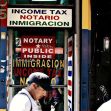Residents throughout Florida are watching closely at the ramifications to follow after a controversial immigration bill was signed into law earlier this month.
On May 2, Florida House members passed Senate Bill 1718, a controversial piece of legislation that aims to curb the flow of illegal migrants throughout the state. According to the new bill, the state will have stronger employment requirements and guidelines regarding undocumented workers, among other initiatives that will impact undocumented immigrants directly and even those visiting the state.
The host of changes the bill will bring about include how companies engage in hiring practices when it comes to undocumented workers. Companies that have 25 employees or more will be required to use the federal E-verification system when hiring. The use of E-verify, which was once limited to public employers and contractors, will now be implemented in other sectors, including the agricultural industry. Companies that do not comply with the E-verification process could face hefty penalties as well as suspension of their business license.
According to recent data, it is estimated that 775,000 undocumented immigrants make up roughly 18% of the immigration population of the state. Immigrant workers make up at least 20% of the state's labor force, with an undisclosed number of those workers being undocumented. Generally, undocumented immigrants gravitate toward jobs in the agriculture, forestry, fishing, and construction industry due to the high demand for work and the lack of available workers.
The bill will also place stricter restrictions on the creation and distribution of identification cards and how driver's licenses can be used. The bill prohibits local governments from contributing money to groups or organizations that create identification cards for undocumented immigrants. Individuals who are non-citizens and have driver's licenses will be barred from using them throughout Florida to transport undocumented migrants across state lines.
Hospitals will also be impacted as facilities that receive state and federal Medicaid reimbursements will now need to closely track how much money is spent on undocumented immigrants in facilities like the emergency room.
The bill will also take away laws that were designed to help undocumented immigrants with certain professions. A 2014 law that allowed immigrants without documentation to practice law in Florida will now be repealed.
In addition to the restrictions and added guidelines that form how undocumented immigrants can exist in the state, the bill criminalizes and levies fines against individuals and companies that aid undocumented workers, subsequently violating the new law. Many have called the bill a clear-cut example of government overreach and abuse of power that infringes on the rights and freedoms of Floridians.
The ACLU of Florida quickly denounced the bill after it passed the governing body. The political director of the ACLU of Florida, Kirk Bailey, criticized the bill, calling it a legal move that would put many individuals at risk.
“It incentivizes racial profiling of a breadth of Floridians and creates a ‘show me your papers’ environment. It actively seeks to criminalize Floridians, hurts businesses and our economy, and undermines our public health system. Nearly 20% of Floridians are immigrants - a bill that directly harms a fifth of our population has no place in our state. Plainly put, this bill is disgraceful,” says Bailey.
The sweeping initiative which was designed to target undocumented immigrants specifically has been met with statewide backlash. Prior to the bill's passage, rumors about the new legislation’s implication began to spread, resulting in a state-wide flight of migrants from critical industries including the construction and restaurant industries.
Additionally, other individuals fear that restrictions such as making it illegal for non-citizens to drive in the state would lead to even more marginalization through police profiling and lack of adequate medical care because of an individual’s race. In contrast, proponents of the bill argue that measures such as restricting who can drive throughout the state will limit the transport of illegal immigrants through Florida.
Many other residents have vocalized their concerns about how the bill targets those most vulnerable in Florida society and how such legislation will ultimately hurt the overall economic growth and stability of the state.
In addition to the criminalization and penalties individuals who support undocumented migrants could face, the bill will also allocate $12 million for the Governor's migrant relocation initiative. The relocation initiative sparked national outrage last year after the governor flew dozens of South American migrants from the state of Texas to Martha's Vineyard in Massachusetts.
The bill was passed with the support of the state’s Republicans, but state Democrats including Representative Susan Valdes have been stout in their disagreement with the new law. "This bill is politically driven, and it's an anti-immigrant bill that will hurt and even kill undocumented immigrants," Valdes explains.
Republican lawmakers vehemently opposed the claim that the bill is anti-immigrant. Instead, they frame it as a bill designed to tackle an immigration problem that is directly impacting all states along the southern border. Republican Representative Randy Fine shared, "We can't solve the problem in Washington. But we can send a message that says in Florida, we've had enough."
The bill is expected to be signed into law when it reaches the governor's desk and will go into effect on July 1st.






